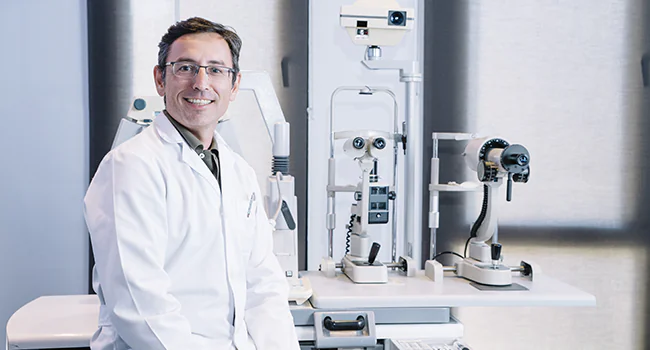Choosing an eye doctor is a priority health decision. After all, you’ll be entrusting them with protecting your priceless sense of sight and assisting you in maintaining a healthy vision for the rest of your life. The first step in deciding is to recognise that there are two sorts of eye care professionals: optometrists and ophthalmologists.
Well, you heard it right! Although it’s possible that some of you may feel shocked after reading this, that’s true. So, if you’re someone who wants to know about the difference between optometrists and ophthalmologists, then you’re at the right place.
What Is An Optometrist?
An optometrist is a doctor who specializes in primary vision care. They are not medical doctors, but they are licensed to perform optometry, which involves giving eye exams, writing contact lenses and glasses prescriptions, detecting primary eye abnormalities, and treating some eye disorders. These optometrists complete a four-year professional programme after college and gain an optometry degree. Following optometry school, some optometrists also receive extra clinical training or complete a speciality fellowship.
What Is An Ophthalmologist?
An eye doctor skilled in eye and vision care is called an ophthalmologist. In terms of training and what they can assess and treat, ophthalmologists differ from optometrists and opticians. Ophthalmologists are licensed to practise medicine and surgery after completing 12 to 13 years of study and education. Ophthalmologists have more extensive training than optometrists and opticians, allowing them to diagnose and treat a more comprehensive range of disorders. A four-year college degree is often followed by at least eight years of additional medical study.
Optometrists And Ophthalmologists Are Not the Same
The distinctions between optometry and ophthalmology are often misunderstood. Even though they both deal with vision care, some prevalent misconceptions exist. Both ophthalmologists and optometrists serve vital roles in eye care, yet their training and skills are vastly different. Yes, one may wonder about the difference between an optometrist and an ophthalmologist and whether there is any difference at all, but the truth is there is.
So, to make it simple, Optometrists are eye doctors (eye care providers) who focus on primary vision care. Yes, that includes everything from vision testing to diagnosing, treating, and managing vision-related issues. But an optometrist is not a doctor. Similarly, a medical doctor specializing in eye and vision treatment is an ophthalmologist. An ophthalmologist examines and cures all eye ailments, performs eye surgery, and prescriptions, and fits eyewear and contact lenses to correct vision issues. Let’s understand optometrists vs ophthalmologists in more detail way by looking at what exactly they do.
What Can An Optometrist Do?
An optometrist evaluates your eye health and visual quality throughout a comprehensive checkup. Many eye diseases can be diagnosed and treated without surgery or further specialist care. Among the services available are:
- Vision screenings and testing
- Prescriptions for contact lenses and spectacles.
- Procedures like removing a foreign body from your eye are minor.
- Vision treatment is provided.
They can often detect underlying health issues you are unaware of that influence your eyes.
Your optometrist can diagnose and treat the following conditions:
- A chalazion, which is a hump on the eye’s margin.
- Inflammation of the cornea (protective outer eye layer) or conjunctiva causes dry eye illness (tissue lining).
- High ocular pressure occurred due to glaucoma.
- Allergies that affect the eyes are known as ocular allergies.
- Strabismus, which is an eye misalignment.
The therapies that optometrists can perform will vary depending on where you live. Optometrists may perform the following operations in addition to tests, vision correction, and minor procedures:
- Prescribe a variety of drugs.
- Patients undergoing eye surgery should get pre-and postoperative treatment.
You’ll almost always need to see an ophthalmologist for surgery and other specialist care.
What Can Ophthalmologists Do?
Ophthalmologists treat a wide range of eye ailments, from minor discomforts to more severe conditions resulting in partial or total blindness.
Some of these eye experts choose to specialize in areas such as:
- Paediatric ophthalmologists diagnose and treat children’s eye disorders and problems.
- Vision disorders involving the brain, nerves, and muscles are referred to as neuro-ophthalmology
- Oculoplastic surgery is a type of surgery that involves plastic surgeries for eyelid tumors, repairing damage eye lids, and other cosmetic eye surgeries.
- Vitreoretinal surgery: diagnose and treat diseases related to the retina and uvea.
Ophthalmologists can prescribe any necessary drugs to patients in addition to writing prescriptions for spectacles and contact lenses. Optometrists specialize in vision and eye health, whereas ophthalmologists specialize in eye surgery. The most common procedures ophthalmologists perform are cataract surgery and glaucoma surgery, among many others.
Optician: Another Type Of Eye Doctor
Yes, there’s one more type of eye specialist and we call it: Optician. An optician, often known as a dispensing optician, is a professional who is trained to fit you with eyeglasses and contact lenses to correct your eyesight. They are unable to issue prescriptions, but they can carry out the instructions contained in those written by eye specialists. Opticians work in optometry and medical offices for about half of their time. They may also be available in establishments that offer eyeglasses and contact lenses.
How To Choose An Eye Doctor?
Now we have understood how to identify optometrists vs ophthalmologists. Optometrists, ophthalmologists, and opticians all specialize in different aspects of eye care. You might be unclear who to see for your specific needs. An optometrist is a fantastic choice if you have vision problems and think you might need glasses or contact lenses.
When visiting an optometrist, make sure to have a complete eye exam. They will refer you to an ophthalmologist for additional evaluation and treatment if there is a concern. If your eye problem requires surgery or you have certain eye disorders that affect your eye or overall health, you should see an ophthalmologist. You can expect the same level of care from an optometrist or an ophthalmologist as you would from any other healthcare practitioner.
WHY CFS?
Consult a primary eye care provider at Centre For Sight if you’re unsure where to begin your search for eye care. They can help you with all your needs and ensure that you have a healthy vision!
Article: Optometrists vs Ophthalmologists: What’s the difference?
Author: CFS Editorial Team | Jun 03 2022 | UPDATED 02:00 IST
*The views expressed here are solely those of the author in his private capacity and do not in any way represent the views of Centre for Sight.





